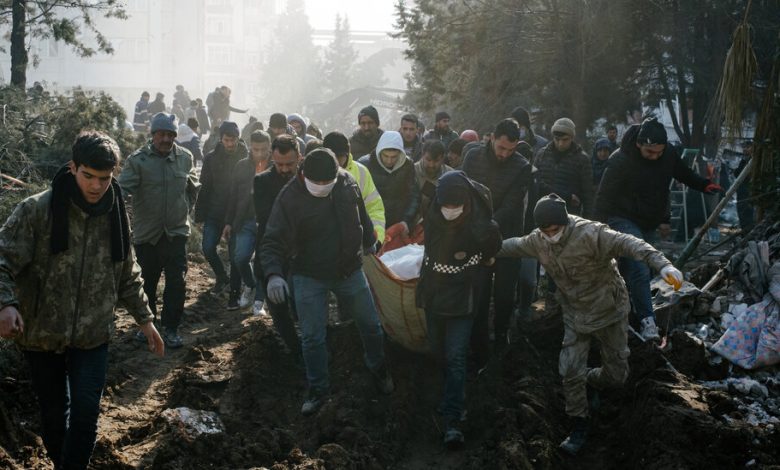U.N. Aid Chief Heads to Earthquake Zone as Death Toll Passes 20,000

The United Nations humanitarian chief said early Friday that he was on his way to visit parts of Turkey and Syria stricken by a powerful earthquake earlier this week, hours after the death toll climbed past 20,000.
The official, Martin Griffiths, will visit Aleppo and Damascus in Syria, along with Gaziantep in Turkey, over the weekend, according to the U.N. secretary general, António Guterres.
“More help is on the way, but much more, much more is needed,” Mr. Guterres told reporters on Thursday.
Earlier in the day, the toll from Monday’s 7.8 magnitude earthquake surpassed the one in 1999 that struck about 60 miles from Istanbul and killed about 17,000 people, according to official figures. Monday’s quake is now Turkey’s deadliest since 1939 and one of the deadliest worldwide in decades.
Turkey imposed a three-month state of emergency Thursday in 10 provinces affected by the quake. In many of the hardest-hit areas, a chaotic atmosphere prevails on the ground.
Deadly Quake in Turkey and Syria
A 7.8-magnitude earthquake on Feb. 6, with its epicenter in Gaziantep, Turkey, has become one of the deadliest natural disasters of the century.
- A Devastating Event: The quake, one of the deadliest since 2000, rippled through neighboring countries; an area along the Syrian-Turkish border was hit particularly hard.
- From the Scene: Thousands of people have been killed, and dozens of cities have been gutted. Here is how witnesses described the disaster.
- A Desperate Search: When buildings fell in Antakya, Turkey, families poured in from all over to help. Videos capture the dig for survivors.
- Syrian Refugees: Millions of people fled the war in Syria for the safety of neighboring Turkey. Now, those killed in the quake are being returned home.
In the city of Antakya, whose ancient old town has entirely collapsed, traffic has been bumper-to-bumper, the air is acrid from the smoke of bonfires as people try to stay warm, and ambulances and trucks bringing aid arrive nonstop. Thousands of people have been sheltering in white tents in the shadow of a soccer stadium.

Syrian refugees displaced by the earthquake in southern Turkey say they need water and more tents to keep their children warm.CreditCredit…Tolga Ildun for The New York Times
Relief organizations say that the first 72 hours after a natural disaster are crucial for finding survivors. Once that window passes, as it already has in Turkey and Syria, the medical burden typically shifts from disaster sites to medical facilities, said Yasushi Nakajima, an expert on disaster risk management at Tokyo Metropolitan Hiroo Hospital in Japan.
“On the other hand, medical facilities that have been responding to the disaster since it began will face major problems of staff fatigue, supply shortages, and supply disruptions, including fuel and water,” Dr. Nakajima said.
“Lives that could have been saved under a normal medical system are being lost as if sand were slipping from their hands,” he added.
Syria, where millions have been displaced by a yearslong civil war, faces its own distinct humanitarian challenges in getting aid.
There have been a few breakthroughs so far. Six




